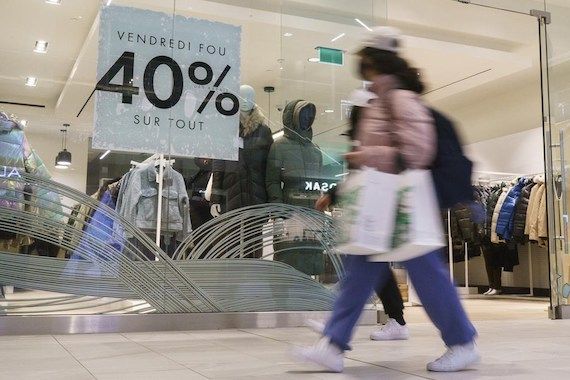
The Royal Bank report adds that household spending that has accelerated with the end of the COVID-19 pandemic lockdowns will slow as prices, interest rates and unemployment rise. (Photo: The Canadian Press)
TORONTO – Canada is heading for a recession in 2023, but it will likely be short-lived and won’t cause as much damage as previous recessions, according to a new report from Royal Bank.
Bank economists say soaring food and energy prices, rising interest rates and persistent labor shortages will push the economy into a “moderate contraction” next year.
“We see growth slowing through the end of this year, but it remains positive, then we expect a two-quarter decline in GDP in the second and third quarters of 2023,” said economist Nathan Janzen of Royal Bank. , during an interview. “This has become the most likely underlying assumption.”
He added that Canada will see a slower rise in the unemployment rate, and then a little faster next year.
Royal Bank says it expects the unemployment rate to reach 6.6% next year, but believes some of that weakness can be reversed from 2024.
The unemployment rate fell to 5.1% in May, its lowest level ever.
“Labour markets will remain very strong in the near term, so we don’t expect a slowdown until next year,” Janzen said. However, the pace of job growth will begin to slow, but that is more due to the limited supply of labor than to demand.”
Meanwhile, the pace of wage growth will pick up for the rest of the year, Ganzen continued, as companies seek to fill job openings and retain talent, and consumers continue to face higher prices.
The report adds that household spending, which has accelerated with the end of the pandemic-related lockdowns, will slow as prices, interest rates and unemployment rise.
Royal also expects home prices to fall 10% over the next year, which will subtract more than $800 billion from the family’s net wealth.
The bank says a three-quarters of a percentage point rate hike is likely next week, similar to the US Federal Reserve last month.
Janzen sees the Bank of Canada making a similar hike in September, eventually raising the key rate to 3.25% by the end of this year.
“There aren’t a lot of obstacles to being completely dynamic in the short term,” he said. It’s cheaper to act quickly in the short term.”
The central bank raised the interest rate by half a percentage point to 1.50% in June, in an attempt to rein in rising inflation.
But Canadian consumers and businesses do not expect inflation to subside significantly anytime soon, according to two opinion polls released by the central bank on Monday.
Among consumers, the short-term outlook for annual inflation is expected to accelerate to 6.8% from 5.1% in the previous quarter’s survey, and the long-term forecast for annual inflation is expected to come in at 4.0%, instead of 3.2% for the previous quarter’s survey. Results.
Companies expect Canada’s annual inflation rate to remain above 5.0% in one year, and to remain above 4.0% within two years.
The next interest rate announcement from the Bank of Canada is scheduled for July 13, and Statistics Canada will release jobs data for June on Friday.

“Subtly charming problem solver. Extreme tv enthusiast. Web scholar. Evil beer expert. Music nerd. Food junkie.”


